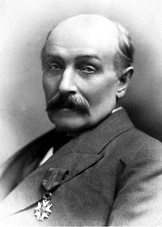William Randal Cremer
William Randal Cremer (born March 18, 1828 in Fareham , † July 22, 1908 in London ) was a British politician . Together with Frédéric Passy , he founded the " Interparliamentary Union for International Arbitration " in 1889 and received the 1903 Nobel Peace Prize for it .
Life
Early years
Cremer was born in Fareham, near Portsmouth, England, to a working class family. His father, the coat of arms painter George Morris Cremer, left the family during his childhood and his mother Harriett had to support William and his two sisters on their own. Cremer was already working in a shipyard when he was twelve , and when he was 15 he got an apprenticeship with his uncle as a carpenter. In 1852 he got a job in Brighton , after which he moved to London . Here he joined the trade union movement and became one of the leading trade unionists.
Work as a trade unionist and worker representative
In 1858 he was elected to the committee for the introduction of the 9-hour day. In 1859 he was a co-founder of the "Amalgamated Carpenters 'and Joiners' Union" , the union of carpenters and joiners. In 1863 Cremer organized a protest against the government of Great Britain, which was sympathetic to the American southern states , and was a member of a workers' committee which supported the American northern states in the fight against slavery . Together with Karl Marx , he co-founded the International Workers' Association in 1864, of which he was General Secretary from 1865 to 1867. In this function he was a delegate of the British section at the meeting of the International Workers' Association in 1866, at which he spoke out in favor of shorter working hours and higher wages, but turned against Karl Marx's plans for revolution . Following the meeting, he broke off contact with the " International ".
As a proponent of negotiation strategies, Cremer was of the opinion that strikes are avoidable and that international conflicts can only be resolved through negotiations. As a result of this way of thinking, he devoted himself increasingly to peace work and founded the Workman's Peace Association during the Franco-Prussian War from 1870 to 1871 , which later became part of the International League for Arbitration . He was the general secretary of this association until 1903.
Political work for international arbitration
In 1868 he stood for the first time for a mandate in the British House of Commons , in 1874 again, but was defeated in these two elections. From 1875 he was a member of the British House of Commons until 1895 and from 1900 until his death. In 1889 he founded the Inter-Parliamentary Union together with the French pacifist Frédéric Passy in Paris and became Vice-President and Secretary of the British parliamentary group. As a result, he was instrumental in the conclusion of numerous arbitration agreements between European and overseas states. During the Boer War , which England waged against the South African Boer states from 1899 to 1902 , the country waived an arbitration agreement and was accordingly loudly criticized by Cremer. He described the war as an attack on freedom and humanity, but it was criticized by the British press.
In 1903 he received the Nobel Peace Prize for his international mediation successes. He donated almost all of the prize money to the International League for Arbitration. He was raised to the nobility in 1907 after King Edward VII had allowed him to take part in the knighting ceremony in civilian clothing and, above all, without a sword . His two marriages (his first wife died in 1876, the second in 1884) had no children. He died of pneumonia in 1908.
literature
- Bernhard Kupfer: Lexicon of Nobel Prize Winners , Patmos Verlag, Düsseldorf 2001
Web links
- Information from the Nobel Foundation on the 1903 award ceremony for William Randal Cremer
| personal data | |
|---|---|
| SURNAME | Cremer, William Randal |
| BRIEF DESCRIPTION | British politician and Nobel Peace Prize winner |
| DATE OF BIRTH | March 18, 1828 |
| PLACE OF BIRTH | Fareham |
| DATE OF DEATH | July 22, 1908 |
| Place of death | London |
